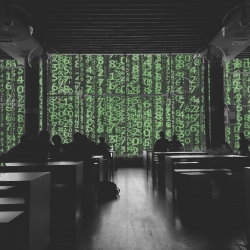This blog discussed COVID-19 as an example of the necessity to foresee impacts of global trends and to address arising consequences to education and learning systems. I have recently engaged in two future-oriented investigations of impacts of global socio-economic and technological trends on education, skills and learning systems[1][2]. The trends analysed are digitalization driven technologies, demographic changes, migration, urbanization, mobility (and brain-drain), climate change, and political instability. In the 2020-paper I have thoroughly analysed the impacts of digitalization and ICT driven technological megatrend on education, skills and learning. Below I discuss how the current Coronavirus outbreak (COVID-19) and related policies give this megatrend a particular meaning by enabling a change in our behaviour, but also a consequent opportunity to shift towards more sustainable future. First, however, by referring to COVID-19, I want to remind of the importance of foresight and future-oriented explorations for the mankind. After COVID-19 we understand even more the necessity to foresee global trends including pandemics. Let me refer to Rafael Popper´s blog post on EU politicians caught asleep at the wheel. It is an example of a research that did not lead to policy actions - policy alert system “of the next pandemics” as suggested by experts. COVID-19 occurred in the midst of global digital megatrend and – after political decisions to avoid social contacts - digital and ICT technologies proved to play a crucial role for human communication during the pandemic. After just a few months of the pandemic outbreak we can see a number of innovative solutions enabled by digital communication means. Diverse remote teleworking applications have emerged in healthcare, education and training, personal communication, online shopping, and various services. COVID-19 has led to a digital jump, followed by surprising changes in our communication patterns, nature of work, occupations and skills, and education needs. COVID-19 is also having significant impacts on climate change: after travel restrictions we see positive signs in air quality mitigating climate change. Moreover, we can witness examples of desired shifts in innovation activities and policies: research, industry and policy communities increasingly recognise the necessity of open and collaborative innovation in developing COVID-19 vaccination. Now that the societies are slowly opening up as the pandemic seems to be easing in some places, we will see how far-reaching the impacts will remain, or whether the changes were of temporary nature only. We will see what we have learned, and, in particular, if we learned to take foresight and future-oriented explorations leading to concrete policy actions more seriously. Coming back to where we started – education and skills – we can conclude that all impacts of COVID-19 mean new challenges also to the future of education and learning systems including also the creation of strong forward-looking culture.
[1] Popper, R. and T. Loikkanen (2019) The Future of Work and Skills in ETF Partner Countries, The Issues Paper, The European Training Foundation (ETF). https://www.etf.europa.eu/en/publications-and-resources/publications/future-work-and-skills-etf-partner-countries.
[2] Loikkanen, T. and R. Popper (2020) Impacts of Global Trends on Work, Skills, Education and related Policies in Developing economies, Proceedings of the International Conference on Innovation Driven Economic Growth in Asia Focusing on India, 27th-29th November 2019, Zaheer Science Foundation and Goa University, in Partnership with UNESCO, New Delhi.
Relevant themes:
Science & Research Policy
Relevant tags: Social innovation, Sustainability



